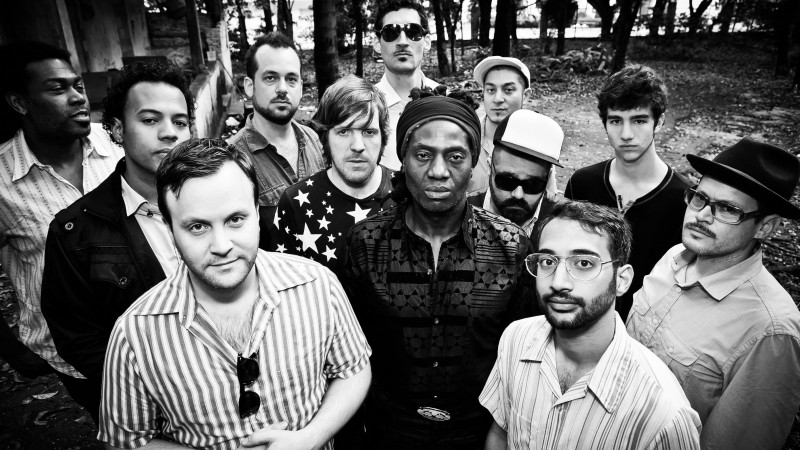I don’t think a band can or should do non-political Afrobeat, in the same way that gospel music would ring hollow if there weren’t the constant, underlying themes of redemption, salvation, and hope beyond the obstacles of the present. In this historic moment where there are so many issues to be addressed, and particularly because we’re based in the U.S. and have a lot of privileges and relative safety compared to say, a musician in Northern Mali, we have a responsibility to be engaged.
How is the idea of music as a weapon more complicated than simply having a Fela figure to rally audiences to action, at least to critical thought?
I think making Fela a martyr of sorts is a dangerous thing. His brilliance, resilience, persistence, and humor is undeniable. But he was a human being just like any of us, and people always want someone cool to wear on a tee shirt without engaging the wholeness of who they were.
For that reason, I think it’s more important to engage with the critiques he makes in specific songs, to understand their relevance to the historic moment in which they were composed as well as how they’re relevant right now. “Water No Get Enemy,” “Upside Down,” “Zombie,” and “Beasts of No Nation” are among the best examples. With this approach, engaging with Fela’s music is a deeper experience and has more revolutionary possibilities.
How might Afrobeat be akin at all to folk music in America, which has lost a little bit of its impact for political power over the decades?
Afrobeat intersects with folk music in the sense that they have both been good media for social commentary but the way the music is made is so different. Afrobeat is an urban, cosmopolitan, electrified music. You need a lot of musicians and instruments to properly execute it, whereas American folk music can be done a capella, or with little accompaniment.
You see social commentary in all types of music, be it jazz, rap, punk, reggae, rock ‘n’ roll or country (once in a while), but it depends on individual artists within those genres committed to speaking truth to power. None of those genres are defined by having social commentary at the root of them.
Nigeria’s political climate and its international relations impacted Afrobeat as used by Fela. Are there similar political charges that shape how you and Antibalas create and employ music today?
There are overlapping themes: crises about natural resources, abuse of police and military authority, unchecked sprawl and technological growth, government corruption, ineptitude and inefficiency, and the power of multinational vultures to supercede the sovereignty of sovereign nations.
At the same time, the climate in the U.S. differs in a lot of ways that are obvious, but too much to get into.
Considering how your work with Antibalas is received internationally, what can you say about international audiences’ needs for a music that drives and is driven by conversations around systemic dysfunction?
I think more and more after 17 years, where things have gotten worse and worse despite what we’ve been promised, people are starting to get it. The messages of “trickle-down economics” and “no child left behind” and “change you can believe in” ring hollow, and people are looking for music that has no false hopes or pretensions yet is still a celebration of life and the power of collective action.
Police in cities across the U.S. have faced increasing public critique for an ongoing list of abuses in the last year. What potential role does a socially conscious music have in a movement toward justice, if any?
Songs can penetrate in ways that books, reports, and speeches cannot. Music has that power of being able to pass through cognitive membranes. A musician can write an anthem that mobilizes people, that has them singing in the streets. Or a musician can write a song that bears witness to something but is not necessarily a call to action or rallying cry. Both are important.
Antibalas takes the Fillmore stage this Friday, Feb. 20, in collaboration with Zap Mama.


